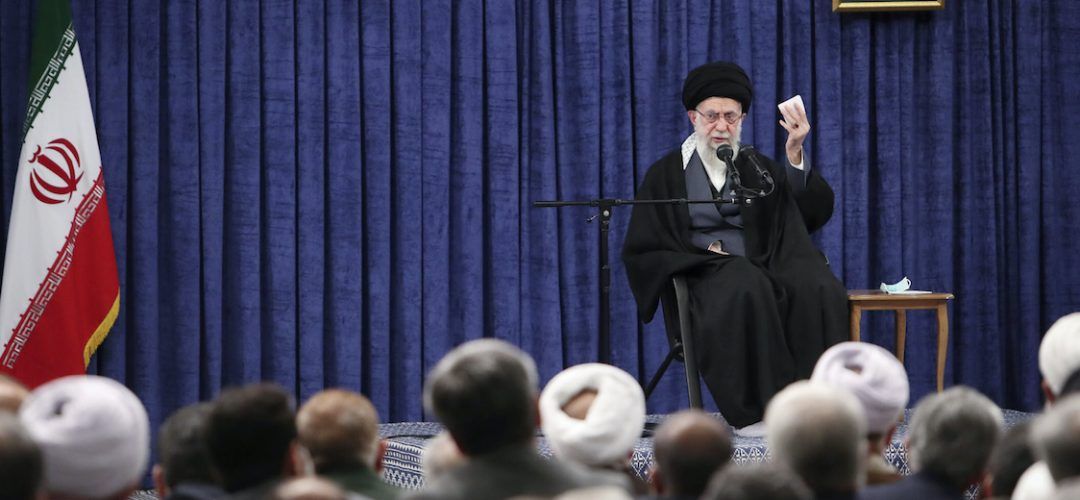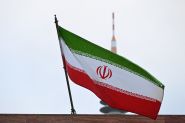- Home
- Middle East
- Khamenei Opens Door to Nuclear Program Negotiations With US

©Iran's Supreme Leader Ayatollah Ali Khamenei during a meeting with members of the Iranian Government in Tehran on April 4, 2023. (Photo by KHAMENEI.IR / AFP)
Iran’s supreme leader opened the door on Tuesday to renewed negotiations with the United States over his country’s rapidly advancing nuclear program, telling its civilian government there was "no barrier" to engaging with its "enemy," as reported by the Associated Press.
Ayatollah Ali Khamenei who has final say on all state matters, set clear limitations for any talks that are to take place under the government of reformist President Masoud Pezeshkian and reiterated warnings that Washington wasn’t to be trusted.
There have been indirect talks between Iran and the US in recent years, mediated by Qatar and Oman, two of the United States’ Middle East mediators when it comes to Iran. Khamenei’s remarks came one day after Qatar’s prime minister visited the country.
When asked for comment, the US State Department told The Associated Press, "We will judge Iran’s leadership by their actions, not their words."
"We have long said that we ultimately view diplomacy as the best way to achieve an effective, sustainable solution with regard to Iran’s nuclear program," it said. "However, we are far away from anything like that right now given Iran’s escalations across the board, including its nuclear escalations and its failure to cooperate" with the International Atomic Energy Agency.
"If Iran wants to demonstrate seriousness or a new approach, they should stop nuclear escalations and start meaningfully cooperating with the IAEA," it said.
Since the deal's collapse, Iran has abandoned all limits on its nuclear program, and is enriching uranium to up to 60% purity — near weapons-grade levels of 90%.
Surveillance cameras installed by the IAEA have been disrupted, while Iran has refused entry to some of the agency’s top inspectors. Iranian officials have also increased threats of pursuing nuclear weapons.
Pezeshkian, a former lawmaker who won the presidency after a May helicopter crash killed hard-line President Ebrahim Raisi, campaigned in part on a promise to reengage the West with negotiations. Khamenei’s remarks as Iran’s paramount leader could provide him with the political cover to do so. Pezeshkian’s new Foreign Minister, Abbas Araghchi, was deeply involved in negotiations on the 2015 deal.
Tuesday’s meeting between Khamenei and Pezeshkian’s Cabinet included an appearance by former Foreign Minister Mohammad Javad Zarif, who helped Iran reach the 2015 deal. After the meeting, Zarif said in an online message that he would continue to serve as a vice president in Pezeshkian’s administration after earlier publicly resigning over the makeup of the Cabinet.
Ayatollah Ali Khamenei who has final say on all state matters, set clear limitations for any talks that are to take place under the government of reformist President Masoud Pezeshkian and reiterated warnings that Washington wasn’t to be trusted.
There have been indirect talks between Iran and the US in recent years, mediated by Qatar and Oman, two of the United States’ Middle East mediators when it comes to Iran. Khamenei’s remarks came one day after Qatar’s prime minister visited the country.
When asked for comment, the US State Department told The Associated Press, "We will judge Iran’s leadership by their actions, not their words."
"We have long said that we ultimately view diplomacy as the best way to achieve an effective, sustainable solution with regard to Iran’s nuclear program," it said. "However, we are far away from anything like that right now given Iran’s escalations across the board, including its nuclear escalations and its failure to cooperate" with the International Atomic Energy Agency.
"If Iran wants to demonstrate seriousness or a new approach, they should stop nuclear escalations and start meaningfully cooperating with the IAEA," it said.
Since the deal's collapse, Iran has abandoned all limits on its nuclear program, and is enriching uranium to up to 60% purity — near weapons-grade levels of 90%.
Surveillance cameras installed by the IAEA have been disrupted, while Iran has refused entry to some of the agency’s top inspectors. Iranian officials have also increased threats of pursuing nuclear weapons.
Pezeshkian, a former lawmaker who won the presidency after a May helicopter crash killed hard-line President Ebrahim Raisi, campaigned in part on a promise to reengage the West with negotiations. Khamenei’s remarks as Iran’s paramount leader could provide him with the political cover to do so. Pezeshkian’s new Foreign Minister, Abbas Araghchi, was deeply involved in negotiations on the 2015 deal.
Tuesday’s meeting between Khamenei and Pezeshkian’s Cabinet included an appearance by former Foreign Minister Mohammad Javad Zarif, who helped Iran reach the 2015 deal. After the meeting, Zarif said in an online message that he would continue to serve as a vice president in Pezeshkian’s administration after earlier publicly resigning over the makeup of the Cabinet.
Read more



Comments